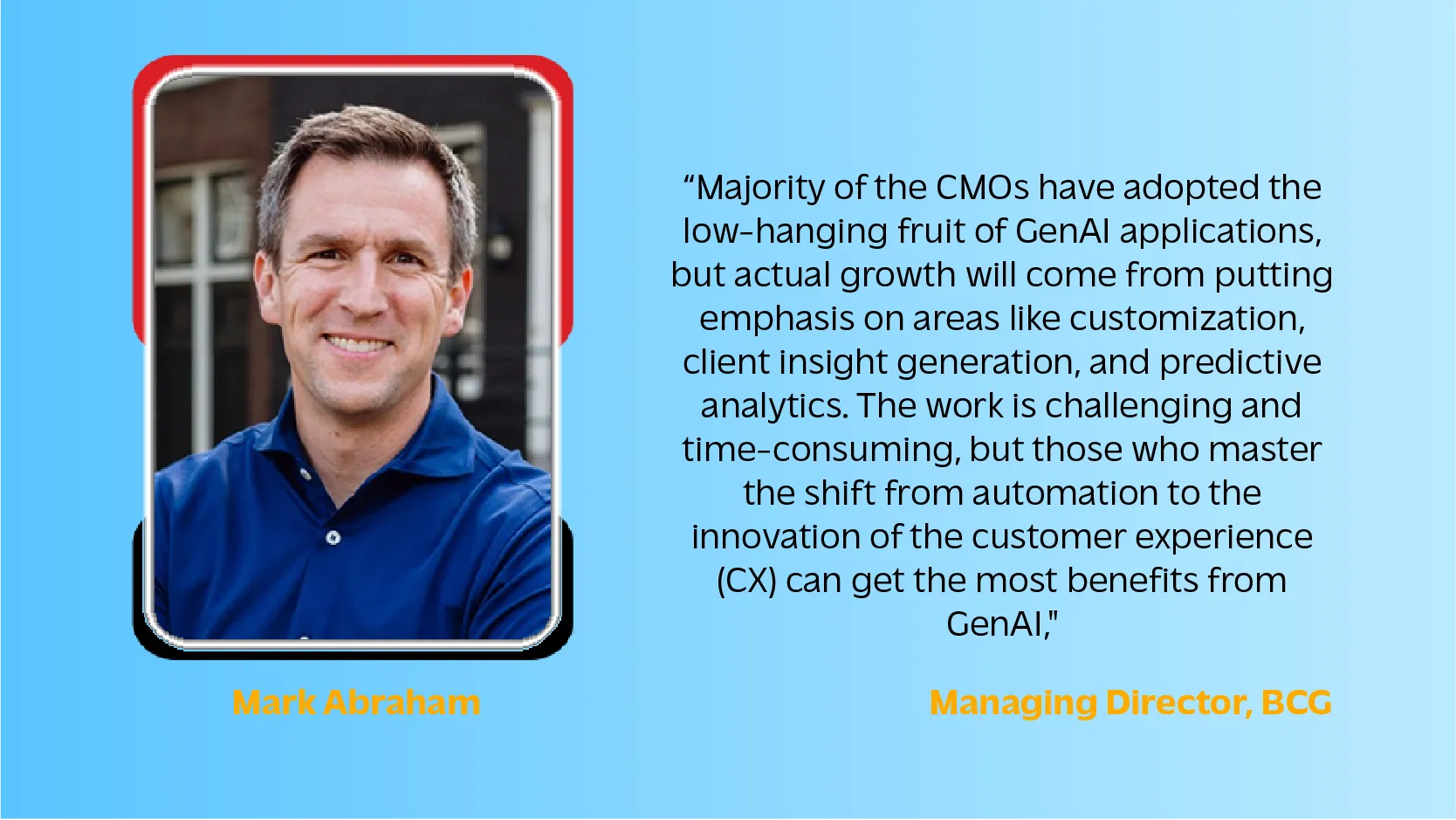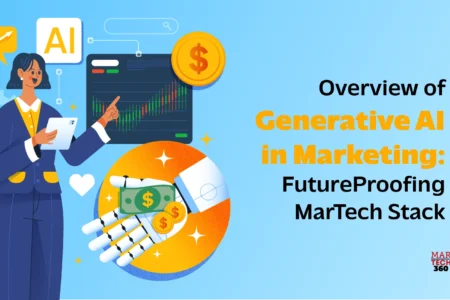Generative artificial intelligence (Gen AI) and its applications are still in the nascent stage. Business leaders are excited about this technology because the early pilots of Gen AI applications have shown compelling outcomes. Enterprises still have a long way to go to seize all the opportunities that technology has to offer in various industries. Industry leaders are still looking at the inherent risk of implementing the technology, how it would impact work operations, and what skills workers would require to make the most. CMOs are exploring opportunities to integrate generative AI in the marketing technology stack to improve operational efficiency.
According to a recent report by BCG titled How CMOs Are Shaping Their GenAI Future, more than half of the CMOs that participated in the survey consider the adoption of AI or generative AI as one of their top five priorities in the coming year.
This blog offers an overview of generative AI in marketing and how CMOs can future-proof their MarTech stack with it.
What is Generative AI in Marketing?
AI or Gen AI in marketing enables pre-sales teams to design and deliver consistent, customized, and reliable customer experiences (CX) seamlessly. Generative AI simplifies marketing operations, allowing marketers to deliver higher ROI on marketing campaigns in a shorter time frame. Following are the ways generative AI will assist in marketing operations:
- Get valuable customer segmentation insights
- Draft customer journeys
- Automate unstructured customer interactions
Integrating Gen AI into the marketing tech stack will assist in minimizing manual work and improve team productivity, accuracy, efficiency, and speed.
The same report by BCG highlights that almost 80% of the respondents surveyed cited that the adoption of generative AI in marketing is already helping them improve automation, speed, and productivity.
What are the Top 3 Advantages of Integrating Generative AI in Marketing?

Implementing generative AI and its applications into the MarTech stack will assist in generating engaging, personalized, high-quality, and relevant content that meets the requirements of the particular target audience. This technology evaluates the client data to detect patterns in consumer behavior to develop content that resonates with the audiences and provokes them to take action. The following are the benefits of adopting generative AI in marketing:
1. Embrace Automation to Save Time and Budget
One of the significant advantages of integrating the marketing technology stack with generative AI applications is it automates content creation. It helps the marketing team to save time and budget to draft marketing materials. The availability of conversational AI tools such as ChatGPT and other AI tools can draft an extensive amount of content in a jiffy, faster than any human can create. Compared to search engine result pages (SERPs), Gen AI can evaluate vast data and represent the information in a precise format. Leveraging marketing automation tools to draft content will eliminate the need for manual work.
2. Draft Tailored Content that Resonates with the Target Audience
Integrating generative AI tools, along with customer data analytics, natural language processing (NLP), and machine learning (ML) algorithms, marketing teams can draft content that resonates with the target audience. These tools evaluate the customer behavior to determine the patterns in their conversations to tailor the interaction to enhance client engagement. Based on the customer’s preferred channel and likes, these tools can customize the email and social media posts.
3. Embrace Innovation in Marketing Operation
The adoption of generative AI in the marketing technology stack will empower enterprises to create innovative and engaging marketing strategies that assist them in standing out from the competition and accomplishing their marketing goals. These tools can encourage the marketing teams to explore new ideas and approaches compared to traditional marketing strategies.
What are the Use Cases of Generative AI in Marketing?
CMOs can seize the following opportunities after integrating generative AI into marketing:
● Automatically Draft Compelling Content
Enterprises can leverage Gen AI tools to automate marketing content creation. These tools are capable of creating images, product descriptions, emails, ad copies, and social media posts based on the prompts. The best generative AI tools for marketing automation can even draft an AI-generated video without the intervention of a human.
● Automate Customer Segmentation
Marketing gen AI tools can evaluate customer demographics, behaviors, and preferences to segment them into groups based on their similar characteristics. These customer segmentations can assist marketers in delivering customized marketing campaigns and relevant offers to improve conversion rates.
● Utilize Predictive Analytics to Predict Client Behavior
Generative AI-powered marketing automation tools provide advanced analytics capabilities, allowing marketers to predict future trends, determine potential opportunities, and understand client demands. Gen AI algorithms offer insights that help marketers make informed data-driven decisions to optimize their campaigns by evaluating previous data and patterns.
● Automate Customer Conversations
Utilization of AI tools in marketing can automate customer conversations through chatbots, virtual assistants, and other messaging tools such as WhatsApp. Enterprises that integrate Gen AI platforms can enhance customer experience, engagement, and sales.
● Improve Low-Performing Marketing Campaigns
Incorporating generative AI in marketing operations can help marketing teams evaluate the performance of each campaign to determine trends, patterns, and improvement opportunities. Marketers can utilize these insights to revamp their campaigns, analyze various strategies, and improve performance to maximize effectiveness and ROI.
Also Read: Cookieless Advertising: What Does this Mean for Businesses? [6 Alternatives]
Six-Step Roadmap for CMOs to Transform Sales and Marketing with Generative AI
1. Execute a Gen AI Audit of all Commercial Initiatives
Before embarking on a journey to integrate generative AI in the marketing technology stack, it is crucial to analyze the pre-sales and sales IT infrastructure and resources skill sets. CMOs can explore the market to understand how open-source or low-cost tech vendors can assist in implementing generative AI use cases.
2. Create a Cross-Functional Team
Business decision-makers can develop a cross-functional team that has resources from all departments. The generative AI integration task force should have expert resources from pre-sales, sales, pricing, and IT. This team can explore all the potential generative AI in marketing opportunities and evaluate its applications for commercial purposes.
3. Find the Low-Hanging Fruit in the Customer Journey
CMOs can identify easy, high-impact, low cost and low-risk use cases of Gen AI, like automation of outreach emails as pilot campaigns to evaluate the impact. Decision-makers can set guidelines to minimize the risks.
4. Educate the Sales Team on How to Use Gen AI Tools
It is crucial to train the fundamentals of generative AI to empower the teams to make the most out of the application. Conducting workshops on how to do prompt engineering to get the required output is essential.
5. Set Guidelines for the Revenue Operations Teams
Business leaders need to set effective guidelines that refrain users from entering sensitive client data into generative AI tools. Additionally, the marketing teams should verify the outputs given by the AI tools, particularly for the content that would be shared externally with the clients.
6. Pilot One or Multiple Generative AI Campaigns
CMOs can embark on their generative AI in marketing journeys by initiating one or more compelling use cases in particular aspects of the sales cycle. It is essential to monitor the results and revamp the strategies to ensure successful broader implementation throughout the marketing operations.
Generative AI Concerns and Ways to Move Forward
Irrespective of the immense benefits offered by generative AI in marketing operations. The technology has various inherent risks that raise multiple concerns about its use. Following are a few key concerns about using AI applications in the MarTech stack:
● Accountability
Accountability is one of the significant concerns as Gen AI algorithms become more independent and can create content and make decisions autonomously. CMOs can put emphasis on transparency and accountability while leveraging generative AI marketing tools to avoid ethical concerns and unexpected consequences.
● Cybersecurity
Gen AI tools can be vulnerable to security risks like unauthorized access, data theft, and manipulation. Business leaders can implement effective cybersecurity postures to secure sensitive data and ensure the integrity and confidentiality of the systems.
● Reliability
The accuracy of the AI algorithms plays an important role in ensuring reliability and consistency. CMOs can evaluate and verify the genuineness of AI models to ensure reliability and reduce errors or inconsistencies.
● Quality of Data
The accuracy of generative AI in marketing depends on the data fed to train the system to create content and make decisions. It is crucial to verify the accuracy and data quality used to train the generative AI models to ensure reliability. CMOs can consider investing in quality data management operations and strategies to ensure optimum levels of data accuracy.
Generative AI in Marketing in a Nutshell
The evolution of generative AI and its applications is happening at a breakneck speed. It has become difficult even for industry veterans to anticipate the future of this revolutionary technology. Generative AI in marketing and sales can tremendously revolutionize operations. Marketing and sales leaders are making the most out of this technology to optimize their operations to achieve excellence. This blog can serve as a playbook for CMOs who are exploring opportunities to integrate generative AI in marketing operations.

